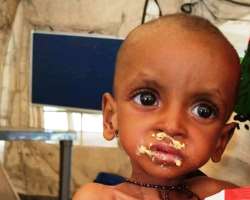Malnutrition causes nearly half of all child deaths -UNICEF

The United Nation's Children Fund (UNICEF) has disclosed that nearly half of all child deaths globally was caused by malnutrition and called for urgent action to stop it.
UNICEF Nutrition Specialist, Abigael Nyukuri said this today in Maiduguri, Borno State at a Media Dialogue with the theme "Integrated and Timely Response to Nutrition-related Humanitarian Needs in Nigeria".
Nyukuri said an estimated 2.5 million children under the age of 5 suffer from Severe Acute Malnutrition (SAM) in Nigeria every year.
She warned that the situation should be taken as an emergency and dealt with holistically so as to safe lives of millions of children.
She noted that 5billion naira is needed to procure Ready to Use Therapeutic Food (RUTF) for the treatment of children suffering from Severe Acute Malnutrition.
The media dialogue was organised by the Child Rights Information Bureau (CRIB) of the Federal Ministry of Information and Culture (FMIC) in Collaboration with UNICEF and the Department for International Development (DFID).
CRIB's Deputy Director, Mr Olumide Osanyinpeju while commending UNICEF for its intervention said all hands must be on deck to stop child malnutrition in Nigeria.
Speaking on the significance of the Media Dialogue, Osanyinpeju urged journalists to report malnutrition issue in a way that will prompt necessary actions to end it.
His words "May I first of all commend UNICEF for their contributions and partnership with the Federal Government of Nigeria, and for the consistent effort being made to ensure that the wellbeing of Nigerian children are promoted."
"We commend UNICEF for all activities being carried out to ensure that malnutrition is curbed and children in Nigeria receive the proper nutrition they need to keep them healthy and grow into well-formed adults capable of driving the affairs of the nation."
He noted that the future of Nigeria depends on producing children who are well prepared to take their place in tomorrow’s society.
"Unfortunately, a large number of these children are at risk of deprivation of basic social amenities, of which nutrition is inclusive; and especially in the Northern rural and hard-to-reach communities."
"Majority of these children are also living in conflict, and communities under emergencies, and it has been difficult taking indeed all basic amenities to them."
"This, therefore, calls to mind the need for us to specifically address malnutrition in children because it directly impacts on their survival and development," Osanyinpeju said.
